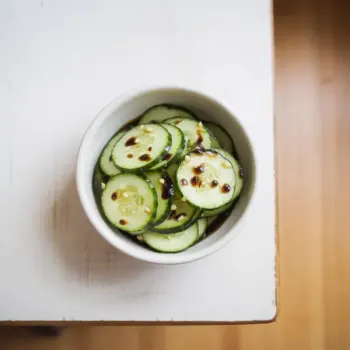
 30 minutes
30 minutesDeliciously tender and buttery scones perfect for afternoon tea, best served with clotted cream and jam.


tablespoons
tablespoons
teaspoons
Unsalted Butter, cut into 1/4-inch pieces and chilled
tablespoons
Dried Currants
cups
cups
1. Preheat Oven
Preheat your oven to 450°F. While the oven is heating, line a baking sheet with parchment paper to prevent the scones from sticking.
2. Mix Dry Ingredients
In a food processor, combine the all-purpose flour, sugar, baking powder, and salt. Pulse about three times just to mix everything together.
3. Add Butter
Scatter the chilled butter pieces over the dry ingredients. Pulse the mixture around twelve times until it resembles a coarse meal with some larger pieces of butter.
4. Combine with Cream and Currants
Transfer the mixture to a large bowl. If using, stir in the dried currants. Pour the heavy cream into the bowl and gently stir until the dough starts to come together, about 30 seconds.
5. Knead and Shape Dough
Turn the dough out onto a lightly floured counter and knead it briefly, just for 5 to 10 seconds, to bring it together. Press the dough into a 9-inch cake pan to shape it, then unmold it onto the counter.
6. Cut and Bake
Cut the dough into 8 wedges and place them on the prepared baking sheet. Bake in the preheated oven, rotating the baking sheet halfway through to ensure even browning. Bake until the tops are lightly golden brown, about 12 to 15 minutes.
7. Cool and Serve
Transfer the baking sheet to a wire rack and let the scones cool for at least 10 minutes. Serve warm or at room temperature with clotted cream or jam.
Fold in dried fruit such as raisins, currants, sultanas, or chopped dates into the dough. You can also use fresh or frozen berries, like blueberries or raspberries, for a juicy burst of flavor.
Mix in chocolate chips or chunks into the scone dough for a classic chocolatey treat. You can use dark, milk, or white chocolate, depending on your preference.
Add the zest of lemon, orange, or lime to the dough for a refreshing citrus note. Glaze the baked scones with a simple citrus icing (mix powdered sugar with a bit of citrus juice) for an extra touch.
For a sweet treat, fold in chocolate chips or chunks. Dark, milk, or white chocolate can be used depending on your preference.
Adding the zest of a lemon, lime, or orange can infuse your scones with a subtle and refreshing citrus aroma. This works beautifully with a dollop of clotted cream and some homemade preserves.
It's crucial to start with very cold butter and cream. The cold fat will melt in the oven, creating steam pockets that contribute to a flaky and tender texture. If possible, chill your mixing bowl and utensils as well.
Preheat your oven and use an oven thermometer to confirm the temperature. A hot oven ensures a rapid rise before the structure sets, which is key to achieving a light and airy scone.
Overworking the dough is the scone's nemesis. Mix until just combined, handling the dough as little as possible to avoid developing too much gluten, which can make the scones tough.
Once your scones are shaped, refrigerate them for at least 15 minutes before baking. This re-chills the fat and helps maintain their shape in the oven.
Keep an eye on your scones and remove them from the oven as soon as they're golden and firm to the touch. Overbaking will dry them out.




Comments (0)